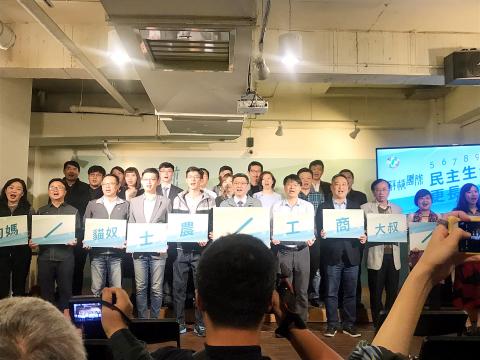The Democratic Progressive Party (DPP) yesterday announced new appointments intended to boost party morale following the DPP’s defeats in the nine-in-one elections in November last year.
At a news conference at the party’s headquarters in Taipei, the DPP referred to the new appointees as the “slash group.”
Each member has various abilities and interests that would “bring creativity” to the party, DPP Secretary-General Luo Wen-jia (羅文嘉) said.

Photo: Su Fun-her, Taipei Times
Lee Ming-li (李明俐), who is one of the party’s new spokespeople, has a background in cultural policy studies, but no experience with politics, which has caused many to look at her appointment with great interest, he said.
Veteran party worker Kao Hsing-hsueh (高幸雪), Taiwan Normal Country Promotion Association member Kuo Kun-wen (郭昆文) and Hsu Chia-ching (徐佳青) of the DPP’s former New Tide faction are to be the party’s new deputy secretaries-general.
Lee Ching-feng (李慶峰) — a former DPP Taipei City councilor — is to head the party’s organizational development department, while Wang Po-chun (王柏鈞), who previously headed the Taiwan Youth Citizen Association, is to lead the communications department.
Johnny Lin (林琮盛), who was a reporter in China, is to head the campaign intelligence department. Veteran party worker Lin Hsiu-ling (林秀玲) is to be secretariat director, while the online communications department is to be lead by Ho Meng-hua (何孟樺), who had been directing the party’s youth department.
Chen Chang-wei (陳長偉), who is to head the social movement department, has worked in Yilan County’s Business and Tourism Department.
Veteran party worker Chiu Shih-yuan (邱世元) is to head the religion department, while the agriculture and fisheries department is to be run by Huang Te-cheng (黃德成), who has a background in agricultural studies.
Chen Yi-ting (陳奕廷), who previously worked in online media, is to head the social issues department.
DPP Hakka affairs department head Chou Chiang-chieh (周江杰) is also to act as a party spokesperson, while the new youth department director, Yan Juo-fang (顏若芳), was previously a Taipei City councilor.
The international affairs department is to be headed by DPP Legislator Lin Ching-yi (林靜儀). Deputy director of the office of the DPP secretary-general Sun Mei-hui (孫美惠) was formerly a member of a well-known dance troupe.
The public relations department is to be headed by businessman Hsieh Yu-li (謝雨利).
The public research center is to be headed by Lee Kuan-yi (李冠毅), who used to be a director at the legislators’ office, as well as the Thinking Taiwan Foundation.
Veteran party worker Lin Ping-chung (林秉忠) is to head the labor department, while former Executive Yuan deputy spokesman Ting Yun-kong (丁允恭) is to be the news department director.
“All of these people have different roles ... but at this moment we all share a single role, which is to fight to protect our democratic way of life,” Luo said.
At the end of the news conference, Luo spoke further about Lee Ming-li, praising her background in foreign languages, translation and the teaching of Taiwanese history.
Lee Ming-li has worked hard to preserve historical Taiwanese sites, he added.
Part of her interest in culture comes from her diverse background, as her grandfather was Mongolian and her grandmother was a Rukai Aborigine, he said.

Alain Robert, known as the "French Spider-Man," praised Alex Honnold as exceptionally well-prepared after the US climber completed a free solo ascent of Taipei 101 yesterday. Robert said Honnold's ascent of the 508m-tall skyscraper in just more than one-and-a-half hours without using safety ropes or equipment was a remarkable achievement. "This is my life," he said in an interview conducted in French, adding that he liked the feeling of being "on the edge of danger." The 63-year-old Frenchman climbed Taipei 101 using ropes in December 2004, taking about four hours to reach the top. On a one-to-10 scale of difficulty, Robert said Taipei 101

Nipah virus infection is to be officially listed as a category 5 notifiable infectious disease in Taiwan in March, while clinical treatment guidelines are being formulated, the Centers for Disease Control (CDC) said yesterday. With Nipah infections being reported in other countries and considering its relatively high fatality rate, the centers on Jan. 16 announced that it would be listed as a notifiable infectious disease to bolster the nation’s systematic early warning system and increase public awareness, the CDC said. Bangladesh reported four fatal cases last year in separate districts, with three linked to raw date palm sap consumption, CDC Epidemic Intelligence

US climber Alex Honnold left Taiwan this morning a day after completing a free-solo ascent of Taipei 101, a feat that drew cheers from onlookers and gained widespread international attention. Honnold yesterday scaled the 101-story skyscraper without a rope or safety harness. The climb — the highest urban free-solo ascent ever attempted — took just more than 90 minutes and was streamed live on Netflix. It was covered by major international news outlets including CNN, the New York Times, the Guardian and the Wall Street Journal. As Honnold prepared to leave Taiwan today, he attracted a crowd when he and his wife, Sanni,

Taiwanese and US defense groups are collaborating to introduce deployable, semi-autonomous manufacturing systems for drones and components in a boost to the nation’s supply chain resilience. Taiwan’s G-Tech Optroelectronics Corp subsidiary GTOC and the US’ Aerkomm Inc on Friday announced an agreement with fellow US-based Firestorm Lab to adopt the latter’s xCell, a technology featuring 3D printers fitted in 6.1m container units. The systems enable aerial platforms and parts to be produced in high volumes from dispersed nodes capable of rapid redeployment, to minimize the risk of enemy strikes and to meet field requirements, they said. Firestorm chief technology officer Ian Muceus said